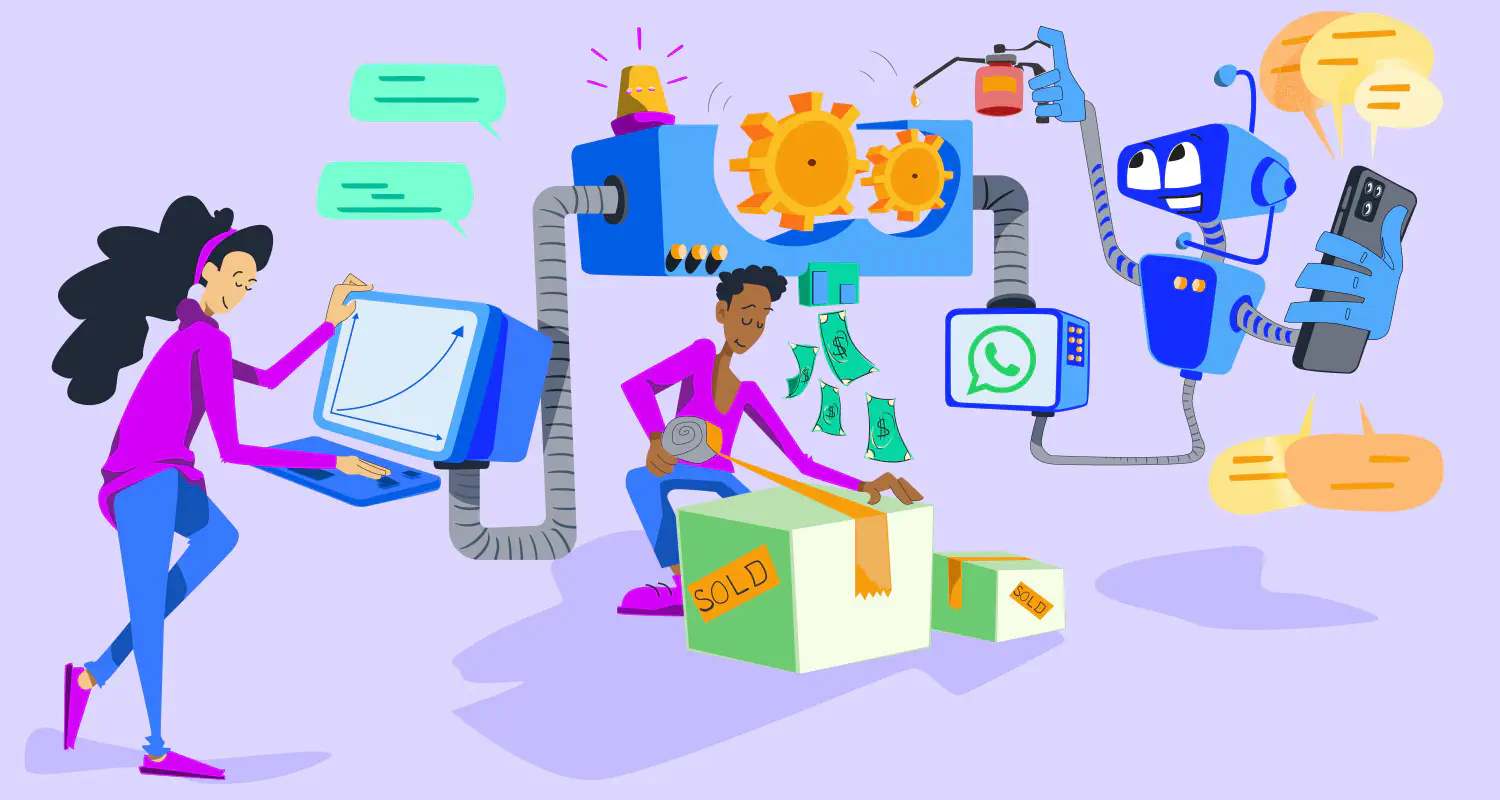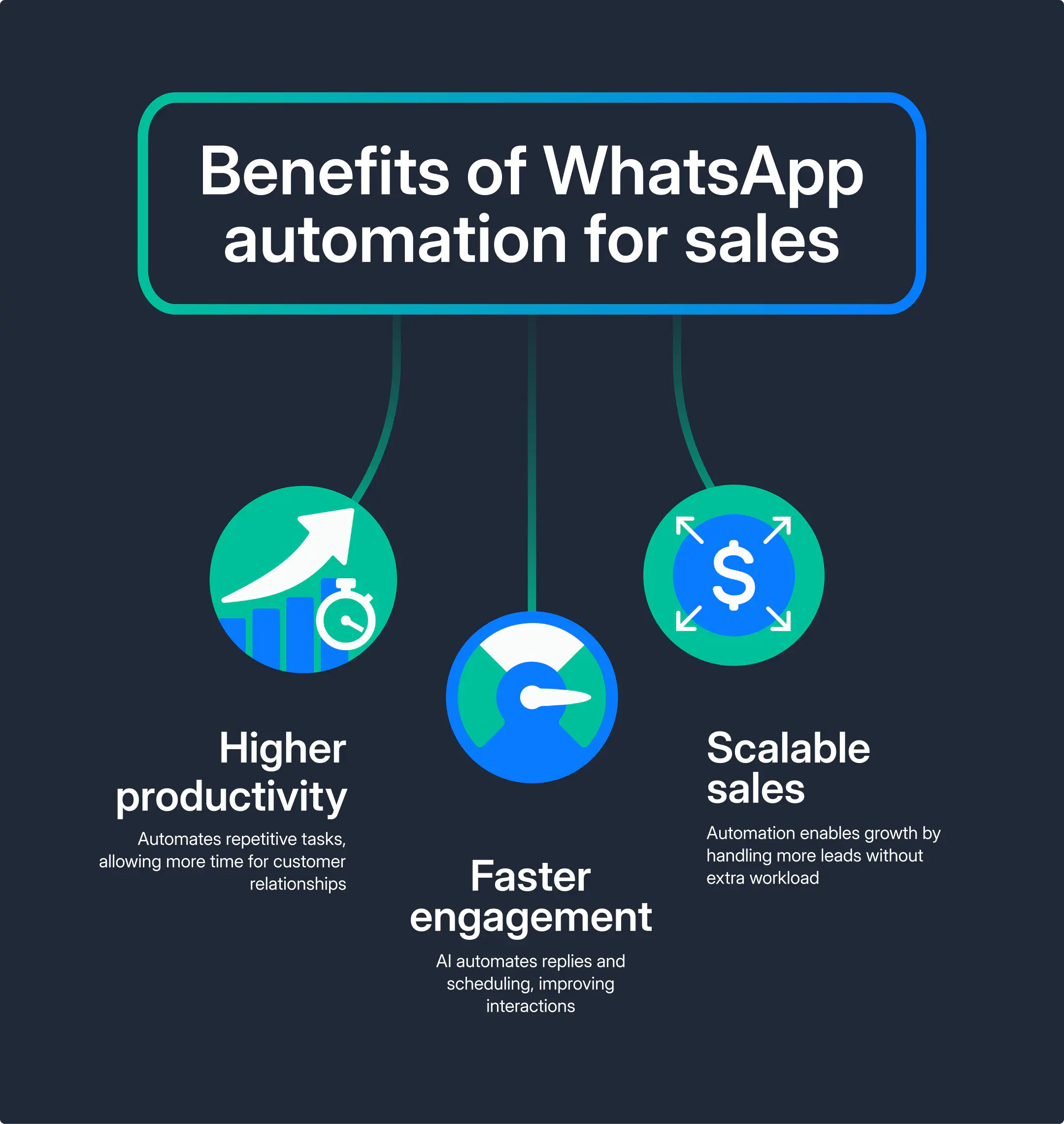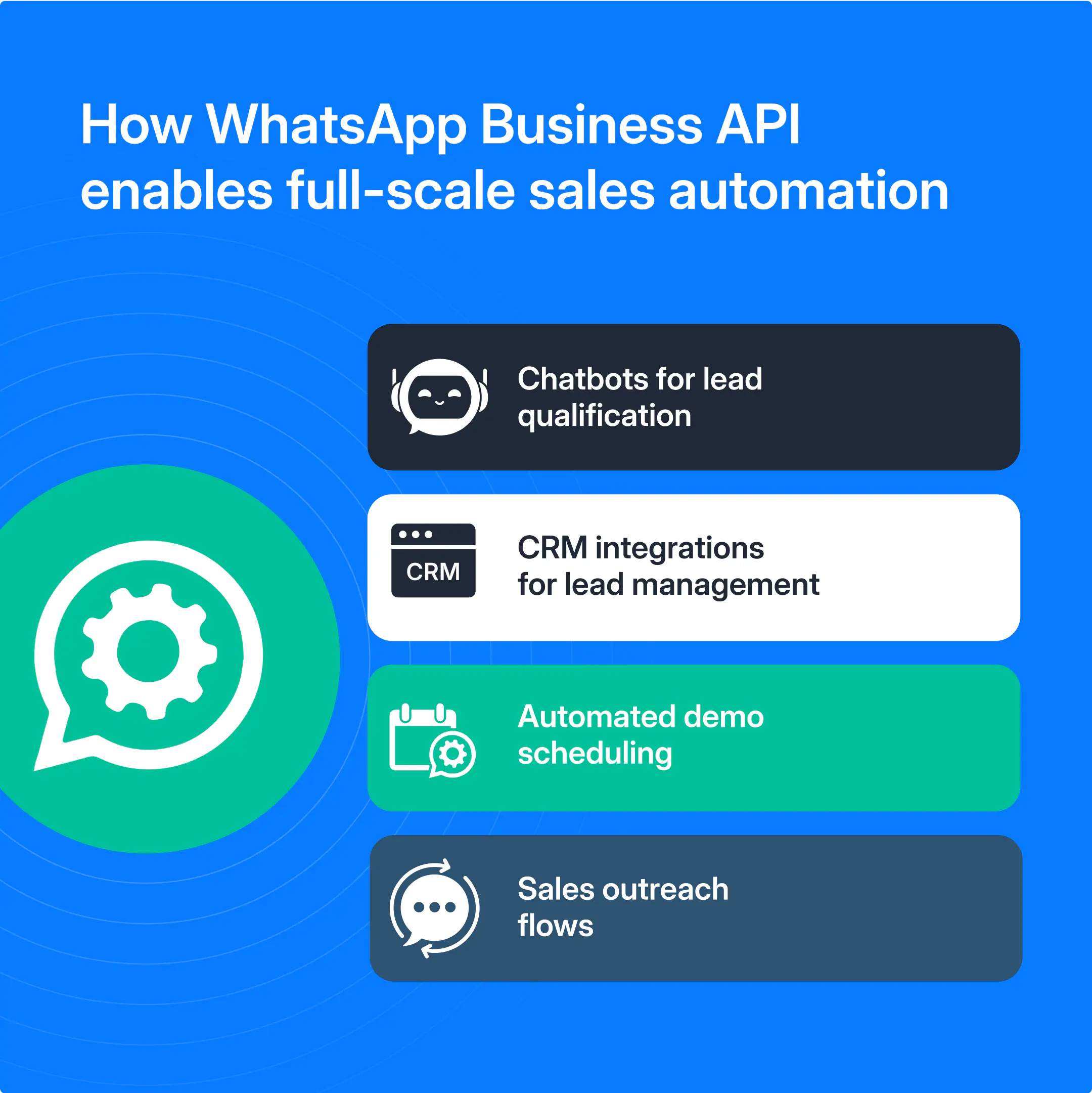WhatsApp Sales Automation: A Sales Team’s Guide

To close a sales deal, you need to connect, qualify, nurture, and address the concerns of your prospects. If you’re doing each of these steps manually and with multiple prospects, how will you manage without dropping valuable opportunities? The good news is, you don’t have to.
Nowadays, many tools can automate some of these tasks for you, including WhatsApp. Its automation features can help you re-engage dormant leads, follow up with customers, and close more deals without extra manual effort on your side.
If you communicate with your customers through WhatsApp, this article is for you. We’ll show you how you can use WhatsApp sales automation to improve your workflows and boost your conversions.
Benefits of WhatsApp automation for sales

Do you know that automation tools save sales agents more than 2 hours every day? In addition to saving time, automation has many more benefits you can enjoy. Here’s a list of them.
Higher productivity and more closed deals
The most notable benefit of automating sales tasks is being able to do more in less time. Using these tools to automate redundant tasks like following up, data entry, and scheduling saves you immense time and effort. You can then spend time on more important tasks, like building genuine relationships with your customers, which gives you more closed deals.
Using a CRM for automation can also help you go a long way. CRMs keep everything organized, from tracking interactions to automatically assigning leads and sending reminders. No more scrambling to remember who needs a follow-up or digging through emails to find the last conversation.
Over time, focusing your energy on tasks that can’t be automated will make your team more efficient, give you more conversions, and help you close more deals. It’s a small change that leads to bigger wins, higher conversions, and less stress.
Faster and more personalized engagement with leads
Engaging with leads is crucial to closing more deals, but doing it manually can slow you down. That’s where AI and automation come in.
Automation tools are available 24/7 and can reply instantly to any customer inquiry you get, which means better engagement and fewer customers lost as a result of slow responses.
Not only replying, but AI can also perform some tasks, like scheduling demos and making product recommendations. And if the conversation reaches a point where AI can’t be useful anymore, it can assign a human agent to finish it. Imagine how smooth the buyer’s journey will be when you have all of these tasks automated.
Because of these features, automating sales tasks can help you retain and build stronger relationships with your customers, which eventually translates to more closed deals.
More scalable sales processes
Besides saving time, automating sales tasks can help your business scale more smoothly. How? You’ll be able to close more deals without hiring extra sales agents. When you automate follow-ups and routine responses, your team will get the chance to connect with more prospects, nurture more leads, and eventually close more deals, all without doing any extra workload.
The bottom line is that automation will help you engage with more customers in a shorter time, which means higher conversions. What comes next? Growth. Your business will scale faster and easier. This domino effect is what gave automation its hype in the first place. It’s quick, smooth, and guaranteed. What’s there to think about?
Basic WhatsApp Business app automation
Many tools allow the automation of sales-related tasks, but WhatsApp is a top choice because of its direct, real-time communication and the fact that most people already use it on a daily basis.
To use WhatsApp for sales, you can either use the free WhatsApp Business app or the priced WhatsApp Business API.
The app is targeted at small businesses and solo sales agents. It provides only the basic features and doesn’t allow for much scaling. However, it still offers automation tasks that can help you sell more, including the following:
- Away messages: When a customer contacts you outside office hours, this automation feature replies automatically to let the customer know you’re away and will be back shortly. This way, you keep leads engaged and don’t miss an opportunity because of a slow reply.
- Greeting messages: Similar to away messages, this feature automatically replies to any customer who contacts your business. It helps you create a good first impression and engage leads instantly till you’re available to converse with them.
How WhatsApp Business API enables full-scale sales automation

For big sales teams, the WhatsApp Business app offers more limitations than features. The real value lies in the WhatsApp Business API, which has many more automation features and unlocks endless possibilities through integrations.
Here’s how you can automate your sales processes with the API.
Chatbots for lead qualification
Starting at the top of the sales cycle, the WhatsApp API can help you automate lead qualification and ensure you focus your time and energy on leads worth pursuing only. How? Through chatbots.
Chatbots are exclusive to the API, and they allow you to automate entire conversations with customers. You can build a lead qualification chatbot by adding a set of questions about the customer’s budget, needs, and business size. You can then set triggers depending on the answers the chatbot gets.
For instance, if the lead fits your criteria, you can set a trigger that labels the lead as qualified in your CRM tool. On the other hand, you can set another trigger that labels unfit leads as unqualified. This way, your team will know at a glance which leads to pursue and which to drop early in the cycle.
To build a chatbot, you’ll need to use a WhatsApp API-based tool with a chatbot builder, like Rasayel.
Rasayel has a drag-and-drop chatbot builder that requires no coding knowledge and takes you minimal effort and time.
CRM integrations for lead distribution and nurturing
After qualification, you need each lead assigned to the appropriate sales agent, perhaps depending on language, location, skills, or else. You can automate lead distribution using WhatsApp Business API to make this process smoother and faster, but how?
The API allows you to integrate WhatsApp with the rest of your tech stack, including CRM tools. In CRM tools, you can set criteria for distribution and choose trigger actions based on them. The tool will then assign each agent a lead to nurture.
Nurturing is also an important step because it turns leads into loyal customers, and the best nurturing strategy? Constant follow-ups. Luckily, the WhatsApp API can help you automate that too.
In the CRM tool, you can build automated workflows that trigger messages based on certain actions by customers. For example, you can set up a workflow that sends a follow-up message on WhatsApp if a lead hasn’t engaged for a specific number of days. This way, you don’t have to keep up with each lead manually.
Integrations for demos and meeting scheduling
The WhatsApp API allows you to integrate scheduling and workflow automation tools with WhatsApp, which means automating a huge chunk of a sales agent’s daily tasks. Instead of spending a long time coordinating with leads, looking for empty slots in your schedule, and confirming meetings, an integration with two simple tools can do it all for you.
Suppose you integrate WhatsApp with Calendly, a scheduling tool, and Zapier, a workflow automation tool. You can set up an automated reply (through a chatbot, for example) on WhatsApp that sends your Calendly link to the lead.
The lead will then choose an available slot on your schedule for the demo. Once booked, Zapier can trigger an automatic confirmation message sent to both you and the lead. When the meeting time approaches, Zapier can trigger a reminder message.
Thanks to a set of tools, you don’t have to worry about a single aspect of scheduling a demo. Imagine how much time you can save.
Flows for personalized sales outreach at scale
WhatsApp Flows is an API feature that lets you build an interactive conversation with a customer using automated replies. You can design a conversation for nurturing leads, guiding customers through the buyer’s journey, or even answering common questions.
The best part about using flows is that the replies will look personal to the customer. They’ll address the customer’s specific concerns and answer their questions in real time, making it look like a human agent is sitting behind the screen. Also, the questions are pre-set by a sales professional, not AI, so they’ll feel more human.
This feature can especially come in handy for at-scale outreach. You won’t have to sacrifice the personalization factor to reach more customers. You can do both, thanks to automation.
Conclusion
Automating sales tasks using WhatsApp can help you engage more leads, follow up quicker, build stronger relationships with customers, and close more deals. It saves you time by performing tasks like lead qualification, distribution, and follow-up. This allows you to focus on more demanding tasks that automation can’t help with, like finalizing deals.
To get WhatsApp’s full potential in automation, you need to use the Business API. It has advanced automation features and integrates with other tools to give you access to even more features. Without its automation capabilities, you’ll find it challenging to scale.
Learn more
If you'd like to learn more about how WhatsApp can help you grow your business, please reach out to us on WhatsApp at +13024070488 (Click to chat now).
We also offer a free consultation session where we review your use case, answer any questions about WhatsApp, and help you build a strategy to make the best out of the platform. Book a call with us here. We'd love to speak with you:
Book a call: Europe, the Middle East, and Africa
Book a call: LATAM
Curious about Rasayel? Schedule a demo today.

Hania is a seasoned researcher and content writer specializing in WhatsApp Business and its role in B2B sales and customer engagement. With years of experience creating in-depth, thought-provoking content, she combines real-life use cases and deep industry insights to help businesses leverage WhatsApp as a growth tool. Her expertise lies in translating complex research into actionable strategies, making her a trusted resource for companies looking to innovate their communication and sales processes.

![How to use WhatsApp for Sales: The Ultimate Guide [2025]](https://learn.rasayel.io/en/blog/whatsapp-for-sales-guide/cover_hu13609196641296032619.webp)


